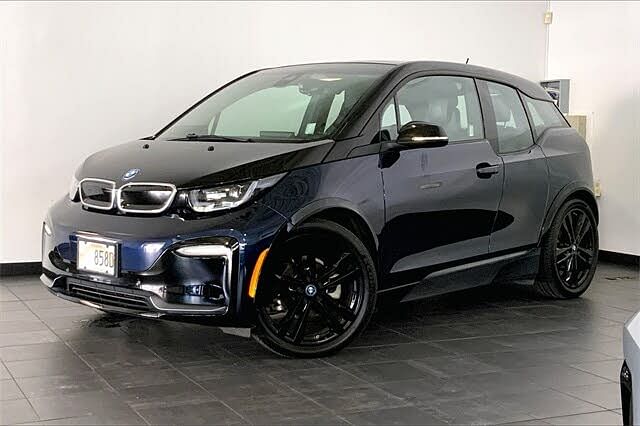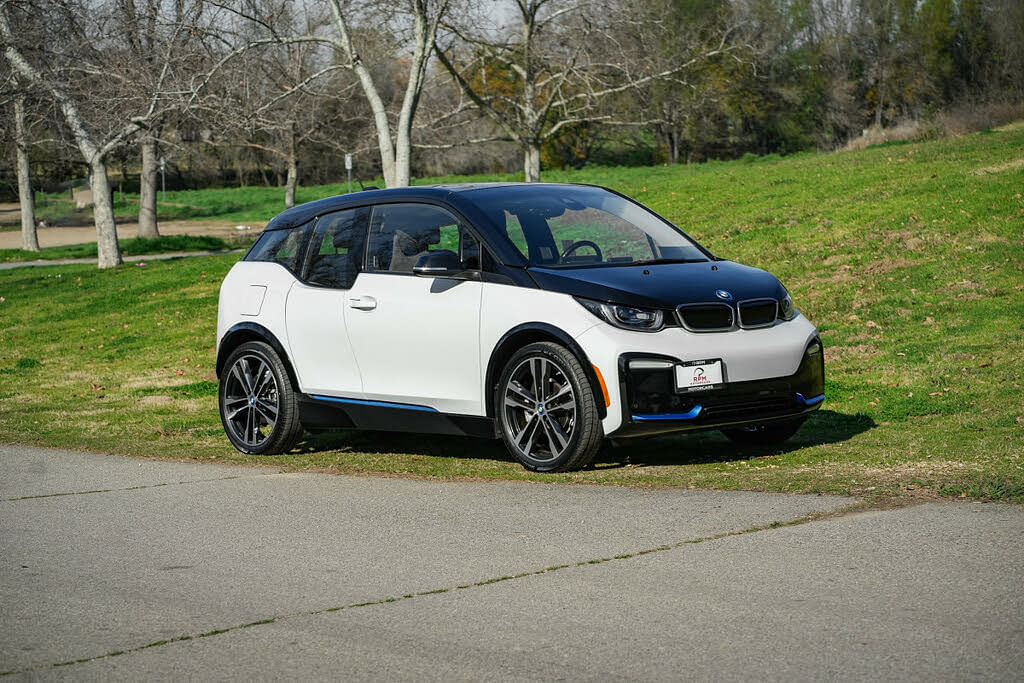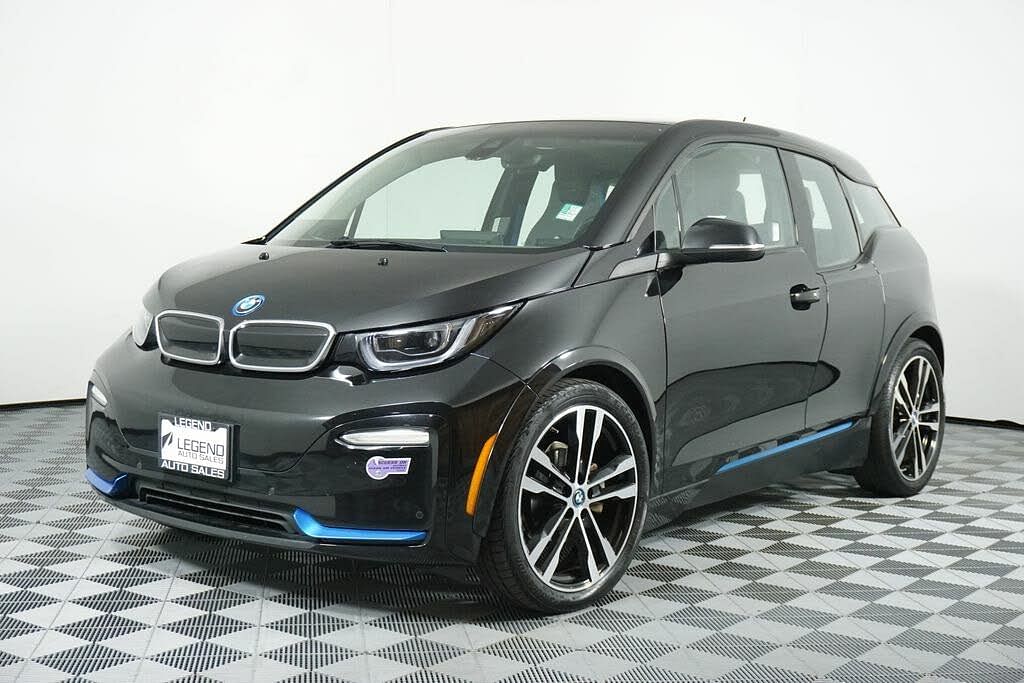2018 BMW i3 S electric
S 5dr Hatchback (electric DD)
2019 BMW i3 S electric
S 5dr Hatchback (electric DD)
2019 BMW i3 S electric
S 5dr Hatchback (electric DD)
2019 BMW i3 S electric
S 5dr Hatchback (electric DD)
2018 BMW i3 electric Review
The i3 mayseem a bit expensive but theinterior quality and modern designmakes it stand out of the box and justifies its high price.
The BMW i3 is indeed a very quick and funky-looking car. Its latest carbon fiber and aluminum structure has made it lightweight and also more competitive. This EV is cleverly engineered which gives it a good power output without compromising on comfort and overall safety. It ranks quite well in the small electric luxury car segment.
Running on an electric motor, this mini i3 pumps out a standard 170-horsepower for the base(i3)and184-horsepower for its higher trim(i3s). It is obviously quite expensive and can go up to$52,050 based on the type of configuration that you desire for. With its special suspension and bigger wheels, it truly brings out the legendary driving dynamics of the EV.
Pricing and Features8.0/10
The 2018 BMW i3 is offered in four different trim levels namely Basei3, i3Range Extender, i3S, and i3S RangeExtender. The major difference between these various trims is its additional gasoline engine in the Range Extender which is used after the depletion of the battery. The base i3 model has the same battery as that of its siblings and comes equipped with19-inch alloy wheels, LED headlights, and Level 3 DC fast-charging capability alongside some major interior overhaul like the keyless entry, rain-sensing headlights, and adaptive cruise among others.
By comparison, the i3s offers more power and sharper handling than the base variant. It has healthy184 hp and 199lb-ft of torque which increases its acceleration as well. However, it is a bit shorter than the i3 but has wider performance tires. Some packages can be included to maximize your comfort and safety. Technology + Driving Assistant can be added to any variant but the upholstery packages for the base i3 Mega World, Giga World, and Tera World.
|
Trims |
i3 |
i3Range Extender |
i3s |
i3s Range Extender |
|---|---|---|---|---|
|
MSRP |
$45,000 |
$48,850 |
$48,200 |
$52,050 |
|
Key features |
Black mirror caps |
Features on BMW i3 plus: |
Carbon Fiber Reinforced Plastic (CFRP) roof |
Slide-through interior floor design |
|
Power-folding, heated side mirrors |
Carbon Fiber Reinforced Plastic (CFRP) roof |
Rear coach doors |
Manual front seats with folding rear-seat access |
|
|
LED headlights |
Rear coach doors |
Kona interior dash and door panels |
Cruise control |
|
|
CapparisWhite non-metallic paint with BMWiFrozen Blue accent |
Velour floor mats |
Slide-through interior floor design |
Instrument cluster |
|
|
BMW-shaped LED daytime running lights |
SeaWorld (includes Atelier European Dark Cloth upholstery) |
Manual front seats with folding rear-seat access |
Tire Pressure Monitor |
|
|
Exterior thermoplastic bumpers, fenders, and door panels |
Driver and 3-passenger seating |
Multi-function steering wheel |
Rear-window defroster |
|
|
HD Radio with "multicast" FM station reception |
50/50 split-folding rear seats |
BMW Navigation Business system with drive controller, 6.5" high-resolution screen, and programmable memory buttons |
Rear-view Camera |
|
|
SiriusXM Satellite Radio with 1-year All Access subscription |
Kona interior dash and door panels |
BMWTeleService |
Tilt/telescopic steering wheel column |
|
|
Cruise control |
Slide-through interior floor design |
USB audio connection |
Power front windows with "one-touch" |
|
|
Instrument cluster |
Manual front seats with folding rear-seat access |
Electric interior trunk and hood release |
||
|
Tire Pressure Monitor |
12V power socket in the center console |
We recommend
If you want a pure and premium EV experience and are willing to shell out more than $40k, then you should go for the base i3 since it will keep your carbon footprint in check. If you wish for more performance then the i3S would be the best option to go for.
Engine and Performance7.9/10
The engine of i3 is quite powerful as its electric motor with a single gear draws from a lithium-ion high-voltage battery with a capacity of 94Ah (33kWh)making it roar with 170 horsepower and peak torque of 184lb-ft. Based on your preference the i3 premium can be fitted with a two-cylinder gasoline range extender which can be used when your battery is running low. With its other trim i3S and a sportier i3 which gets a bit14bhp/15lb-ft power hike compared to its base variant.
|
Models |
BMW i3 |
Hyundai ioniq |
Chevrolet Bolt EV |
Nissan Leaf |
|---|---|---|---|---|
|
MSRP |
$45,000 |
$36,000 |
$31,842 |
$35,998 |
|
Engine |
AC Synchronous Electric Motor |
AC Electric motor |
AC Electric motor |
AC Electric |
|
Transmission |
1-Speed Automatic |
1-Speed Automatic |
1-Speed automatic |
1-speed automatic |
|
Power |
170hp |
120hp |
200hp |
147hp |
|
Torque |
184lb-ft |
215lb-ft |
266lb-ft |
236 lb-ft |
Among its peers, the Chevrolet Bolt steals the show with its 200hp output and the best-in-class torque of 266lb-ft. The Hyundai Ioniq has the least power output among the rivals but has an impressive torque figure that is higher than pricier i3. The Nissan Leaf pushes out a decent 147 hp and an equally impressive 236lb-ft of torque.
Acceleration
Having gained 122 pounds more than its previous avatar, the BMW i3 is a quick car as per the electric vehicle category, but it takes7.4 seconds to get to 60 mph instead of 7.1 seconds which was the record for its predecessor. However, the acceleration times are decent enough to beat the city traffic easily as well as out on the highway.
|
Models |
BMW i3 |
Hyundai ioniq |
Chevrolet Bolt EV |
Nissan Leaf |
|---|---|---|---|---|
|
0-60 MPH |
7.2 sec |
8.7 sec |
6.5 sec |
7.4 sec |
|
Quarter mile |
15.7 sec |
16.8 sec |
15 sec |
15.8 sec |
|
Engine |
Electric Motor |
Electric Motor |
Electric Motor |
Electric Motor |
Surprisingly, the Chevy Bolt is the quickest one to complete the quarter-mile run as well as the 0-60mph dash. The Nissan Leaf has almost similar performance figures as the i3 while the Ioniq proves to be the most sluggish offering among the rivals.
Ride and Handling
Being an all-around performer BMW i3 boasts of a finely balanced handling and responsive steering. Despite its heft, the EV is quick and its tires being impressively coordinated doesn't ruin your comfort. You'll be surprised by its excellent city maneuverability and ultra-tight-turning radius because of its swift and agile steering. However, the vehicle is susceptible to following grooves in the road.
A specially engineered lightweight carbon fiber construction and batteries being placed under the floor, it has a low center of gravity along with its rear-mounted propulsion system which gives it a slight rear weight bias that aids traction.
Braking
The i3 is quite stable even during panic brake tests due to its regenerative brakes. Even while stopping hard it doesn't create any natural pedal feel just because of its substantial off-throttle regenerative braking. It requireS just 125feet to stop from 60 mph, which is around 20feet shorter than its lighter predecessor. Once you get familiar with the natural off-throttle regenerative braking-you'll be able to use one pedal driving making your ride more efficient and fun.
|
Model |
BMW i3 |
Hyundai ioniq |
Chevrolet Bolt EV |
Nissan Leaf |
|---|---|---|---|---|
|
Brake Front(in) |
11.0 |
11.2 |
11 |
11.1 |
|
Brake Rear(in) |
11.0 |
11.2 |
10 |
11.5 |
|
Curb weight(lbs) |
2961 |
3164 |
3563 |
3433 |
|
60-0 MPH |
125 |
N/A |
N/A |
N/A |
Though the 60-0mph figures are not available for the i3’s rivals, from their curb weight and the brake rotor dimensions we can assume their stopping distance would be slightly more than that of the i3 however, since all of these are EVs and are equipped with regenerative braking systems, their performance would be just at-par with the i3 if not better.
Fuel Economy9.9/10
The combined EPA of i3 is 112 mpg-e which is quite decent for a premium EV hatchback. While driving up on the highway it may consume much of the i3's battery juice compared to the city drive. Because of its aerodynamic drag, the city driving feels more adventurous. However, the gasoline-fueled range-extending generator comes into the picture when the EV’s charge drops to 5 percent. You have the option of refueling the i3 with its range extender and keep going, but the BMW's tiny 2.4-gallon gas tank adds only 80 miles of gas-powered range, according to the EPA.
|
Model |
BMW i3 |
Hyundai Ioniq |
Chevrolet Bolt EV |
Nissan Leaf |
|---|---|---|---|---|
|
MPG (city) |
126 |
150 |
128 |
125 |
|
MPG (highway) |
99 |
122 |
110 |
100 |
|
MPG (combined) |
112 (mpg-e) |
136 (mpg-e) |
119 (mpg-e) |
112 (mpg-e) |
The Hyundai ioniq might be the slowest one to complete the acceleration test, but it shines in the driving range at all fronts. It offers the maximum city, highway and combined driving range while the Nissan Leaf has almost similar driving range as the i3. The Chevrolet Bolt offers a decent mpg-e as opposed to its competitors.
Interior7.0/10
The 2018 BMW i3 can easily accommodate four adults with adequate legroom and headroom all around. But the rear occupants may find the rear seats a bit cramped which can be bothersome if you are planning for long-distance cruising. Keeping intact its brand name, the BMW i3 has very comfortable seats and it exhibits a high level of the interior quality that is unique for a small car.
The inside of the car is superbly quiet which makes the ride more comfortable. Its uniquely designed suspension absorbs road imperfections which likely boosts up your comfort level.
|
Model |
BMW i3 |
Hyundai Ioniq |
Chevrolet Bolt EV |
Nissan Leaf |
|---|---|---|---|---|
|
Passenger capacity |
4 |
5 |
5 |
5 |
|
Front (Head/Shoulder/Leg) (In.) |
39.1/56.1/42.2 |
39.6/53.6/40.5 |
39.7/54.6/41.6 |
41.2/54.3/42.1 |
|
Second (Head/Shoulder/Leg) (In.) |
37.4/55.0/35.7 |
37.2/49.2/31.9 |
37.9/52.8/36.5 |
37.3/52.5/33.3 |
Apart from the i3, all the EVs can accommodate 5 adults. The Nissan Leaf offers an impressive headroom for the front seats while the rest of the dimensions are almost similar for all the cars. Also, all the rivals of the i3 have a decent rear seat for adults and are comfortable for long distance cruising.
Infotainment
BMW has done justice to its i3 variant by upgrading its infotainment system and it comes with a drive that is quite efficient and easy to use. The knobs are easy to reach from the driver's seat keeping it in good proximity in terms of usage. Here's the list of infotainment features that you can enjoy with BMW's i3: -
- Harman Kardon sound system
- Apple CarPlay
- Bluetooth
- USB
- AUX
- LED Screen
Cargo volume
The BMW i3 has an average cargo capacity at 15.1 cubic feet. Since the electric motor and generator are caged under the floor it minimizes the total cargo area. However, after folding the rear seats you'll be able to manage more items as the storage capacity of i3 doubles to 36.9 cubic feet of space. The loading height is also too high compared to its peers. The setup of its engine is offset by a high roof and absolutely flat-folding rear seats.
|
Model |
BMW i3 |
Hyundai Ioniq |
Chevrolet Bolt EV |
Nissan Leaf |
|---|---|---|---|---|
|
Cargo Capacity |
15.1 cu.ft. |
23.0 cu.ft. |
16.9 cu.ft. |
23.6 cu.ft. |
The Nissan leaf offers the best boot capacity despite being an EV since its propulsion complexities are mounted under the hood. The Hyundai Ioniq also offers almost similar boot space as the Leaf and proves to be quite practical. The Chevy Bolt also suffers from the same problem as the i3 and hence its boot space is restricted only to 16.9 cu-ft.
Exterior7.0/10
It's said that the BMW i3 resembles a pair of AirJordan sneakers which is surely so as it's one of the most ambitious BMW designs in its recent history. Their design has made rave reviews and its peers have been getting complex because of its attractive looks. The i3 model stands out from its other distant sibling because the brand has shed off its conservative approach of designing the vehicle and has come up with something new that is quite impressive.
The compact electric powertrain makes its way to the short front overhang that is matched in the rear. It's stretched wheelbase may give you the impression that it's wide but when compared to its rivals it largely remains short. However, its height covers up its shortness just like the philosophy Chevrolet adopted for the Bolt EV. The unique suicide-door-like opening mechanism of the rear doors really makes it stand out from the crowd.
|
Model |
BMW i3 |
Hyundai Ioniq |
Chevrolet Bolt EV |
Nissan Leaf |
|---|---|---|---|---|
|
Curb Weight |
2965 lbs |
3164 lbs |
3563 lbs |
3433 lbs |
|
Length |
158.3" |
176.0" |
164.0" |
176.4" |
|
Width |
69.9" |
71.7" |
69.5" |
70.5" |
|
Height |
62.9" |
57.1" |
62.8" |
61.4" |
|
Ground Clearance |
N/A |
5.5" |
N/A |
5.9" |
|
Wheelbase |
101.2" |
106.3" |
102.4" |
106.3" |
While the BMW i3 has a tall-boy design, its rivals feature a traditional hatchback design with a sloping front end. The Hyundai Ioniq looks distinctive with its futuristic looking front fascia and smooth lines running from front to the back. The Chevy Bolt looks like a typical hatchback with an ordinary design. The Nissan Leaf features a sporty design with an angry-looking front grille and big headlights. The Leaf’s overall design instills a vibe of owning a premium electric hatchback which is excellent at its price point.
Safety9.9/10
The BMW 2018 i3 still doesn't have a crash test rating from the National Highway Traffic Safety Administration(NHTSA). However, the IIHS has given it a good score for several tests conducted by them. Alongside its crash test-reliability, the i3 has some standard safety equipment like the rearview camera, rear parking sensors, and rain-sensing windshield wipers. As per your trim choice, you can also include features like adaptive cruise control with stop and go capabilities, front parking sensors, and an active parking assistant can be included.
Safety and Features
Anti-theft alarm system Acoustic safety-belt warning
- BMW AssisteCallincludes Emergency Request (SOS button) and Enhanced Automatic Collision Notification
- BMW Remote Services includes Stolen Vehicle Recovery, Remote Door Unlock, and BMW Connected App Compatibility
- Programmable LED Daytime Running Lights
- Anti-lock Braking System (ABS)
- Impact sensor that activates Battery Safety Terminal disconnect of starter generator
- Front and rear Head Protection System (HPS)
- Driver's and passenger's front airbag supplemental restraint system (SRS) with advanced technology
- Seat-mounted front side-impact airbags
- Front safety belts with automatic pretensioners
- Front-passenger-seat-occupation recognition with Passenger's Airbag Off indicator
- CodedDriveawayProtection
- Automatic-locking retractors (ALR) on all passenger safety belts for installation of child-restraint seat
Competition6.0/10
Hyundai Ioniq Vs i3 Hatchback
What makes the Hyundai Ioniq stand out from its peers is its performance for the price offering and also the utility it offers in the form of a big boot capacity. Since it's a Hyundai, you'll be ushered with a modern interior and superb reliability at a much lower price point than the i3.
It also flaunts its attractive and practical hatchback body style. However, it does suffer from a lackluster performance among its rivals.
Chevrolet Bolt Vs i3 Hatchback
The Chevrolet Bolt of 2018 has more range than the i3 and this feature alone makes it a better option than the latter. It also comes equipped with plenty of safety features and advanced tech.
It impresses you with its nimble handling and is easy to drive around cities. However, it may be a bit problematic or tricky to park the vehicle since the car's nose is hard to see. However, it does suffer from a restricted boot space like the i3.
Nissan Leaf Vs i3 Hatchback
The most attractive feature of the Nissan Leaf is its big boot capacity despite being an EV. Even with its decently luxurious interior, it is priced very competitively and offers quite a bit of optional to make it even more exciting.
It also has a way better torque output than the i3 that makes it quite nimble around the city traffic.
Final Verdict5.8/10
The i3 may seem a bit expensive but the interior quality and modern design make it stand out from the crowd and justifies its hefty price tag. This model by BMW boasts of an intriguing mix of high-quality and eco-friendly materials with the typical solid BMW switchgear which is complemented by its peppy acceleration and agile handling. Being a modern EV it still doesn't catch up to the level of performance and driving dynamics as you'll expect from a BMW. No doubt the i3 is well suited as an agile city car which is quite eco-friendly and has a healthy mpg-e rating which appeals to a wider audience for being a green car. With many options at a lower price at hand, you can still consider some other vehicles unless you are a hardcore BMW fan.


